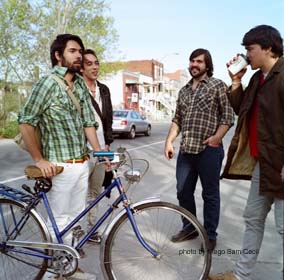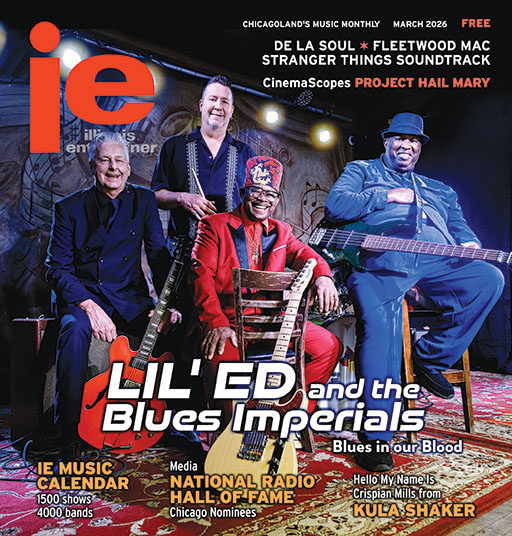Wolf Parade interview
Wolf Parade
Cannibalized

Thank goodness the primary season concluded when it did. Wolf Parade drummer Arlen Thompson was on the brink of U.S.-politics overload by the time Barack Obama clinched the presumptive nominee slot, and he’s not even American.
Appearing: Tuesday, July 8th at House Of Blues in Chicago.
“I was kinda like really into it,” he says, “and then I didn’t realize it would go on for like six or eight months by the end. I thought Super Tuesday would be it. It’s kinda interesting because obviously, being in Canada, what happens in the States will affect us.” Thompson refuses to name a favorite candidate, however — the political climate at home in Montreal is more perplexing and worth his endorsement.
Speaking by phone last month, Thompson was holding down the fort as Wolf Parade’s album neared release and the current tour grew closer. With co-vocalists/main songwriters Dan Boeckner and Spencer Krug away at a Jamaica wedding and touring Europe with a side project, respectively, Thompson was left to do the dirty work: booking the van and keeping track of the mail. There was also the price of gas to worry about.
“The fuel costs on this tour are gonna be massive — like $12,000 or something in fuel for a month,” Thompson calculates while ripping open an $188 royalty check from SOCAN (Society Of Composers, Authors, And Music Publishers Of Canada). The bonus won’t exactly make a dent, but luckily, because of the members’ varied schedules, the band only tour once per year. It’s not like Wolf Parade accrue expenses on par with road hogs like the Dave Matthews Band.
Side projects be damned, the Canadian yelpers finally congregated long enough to put forth the follow-up to their career-making 2005 debut, Apologies To The Queen Mary (Sub Pop). Released in June, At Mount Zoomer is overdue but should hardly be considered the quintet’s sophomore effort — Boeckner and Krug’s various tristes (the former’s Handsome Furs with wife Alexei; the latter runs Sunset Rubdown and joins Dan Bejar in Swan Lake) are practically family. Still, Boeckner and Krug exhibit a magic together that’s absent when they separate.
The magnetic pull of Krug’s idiosyncratic and disjointed wail and Boeckner’s propelling, “Born To Run” fervor meld seamlessly on Zoomer, which probably stems from the band’s choice to lock the world out. Rehearsing and recording in Arcade Fire’s church-turned-studio in rural Quebec nearly turned the Parade into cloistered monks; Thompson the abbot pulled double duty as drummer and engineer, allowing the band to wing it.
“It’s really a record of us coming together as musicians,” he says, “where I think Apologies is more . . . everyone working as more like songwriters and songs. This one’s way more just as musicians.”
With many tracks clocking in past the seven-minute mark, Boeckner’s chugging guitar, Krug’s kooky keyboards, Hadji Bakara’s swirling sound distortion, Dante DeCaro’s sinewy guitar, and Thompson’s steady hands, especially on the epic “Kissing The Beehive,” showcase a leaner, cohesive group.
According to Thompson, the band had a few tunes collecting dust until the recording equipment flashed “on,” though these, in the end, were scrapped in favor of starting from scratch.
“When we got back together there was a real question of ‘what do we want to do,’ like what kind of record we wanted to make,” he acknowledges. “We approached it just like a real blank slate of what people wanted to do. We just started playing together and . . . improvised.”
These jam sessions progressed until songs formed fully and presented themselves naturally to a live recording environment. “The way we started making this record was through just playing together, so it just made sense to carry that over to the recording and just kind of record what we were doing as it happened,” Thompson explains. “We wanted something that was . . . really honest and really raw.”
The speed at which the compositions took shape injects a serum of freshness and carefully crafted abandon throughout the album’s 46 minutes. “The first album was put together over a much longer time,” he suggests, somewhat unbelievably, “so all those songs had a large gestation period. Where this record, it was basically all the songs were formed before we even had a chance to play them live, so they were all kind of written and put together and arranged within quite a fairly tight time span.”
— Janine Schaults
For more on the new album’s genesis, grab the July issue of Illinois Entertainer, available free throughout Chicagoland.











